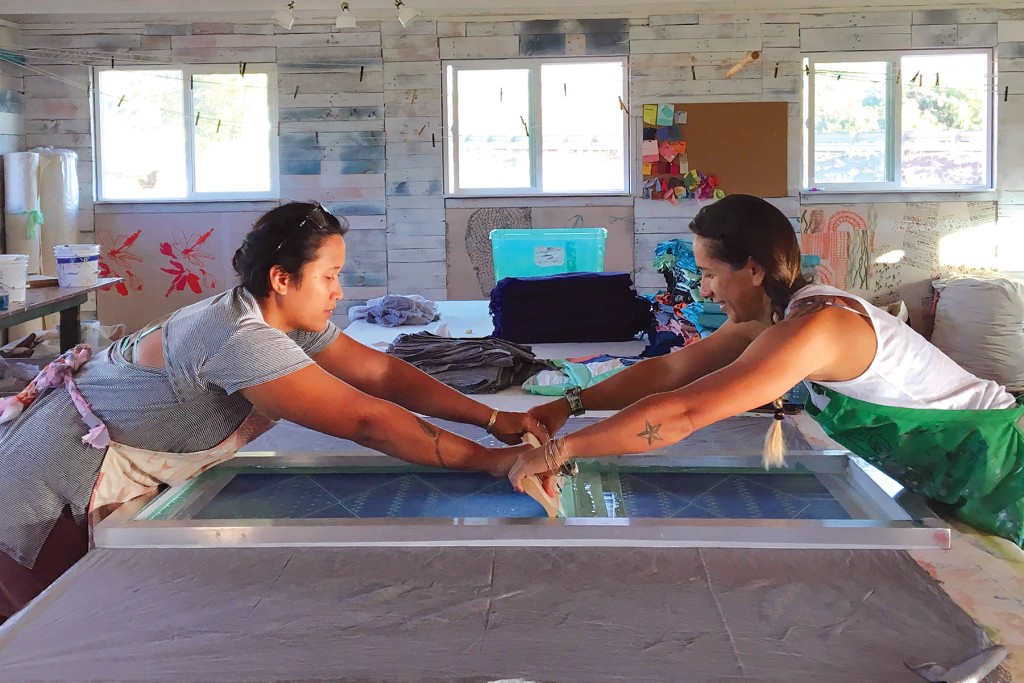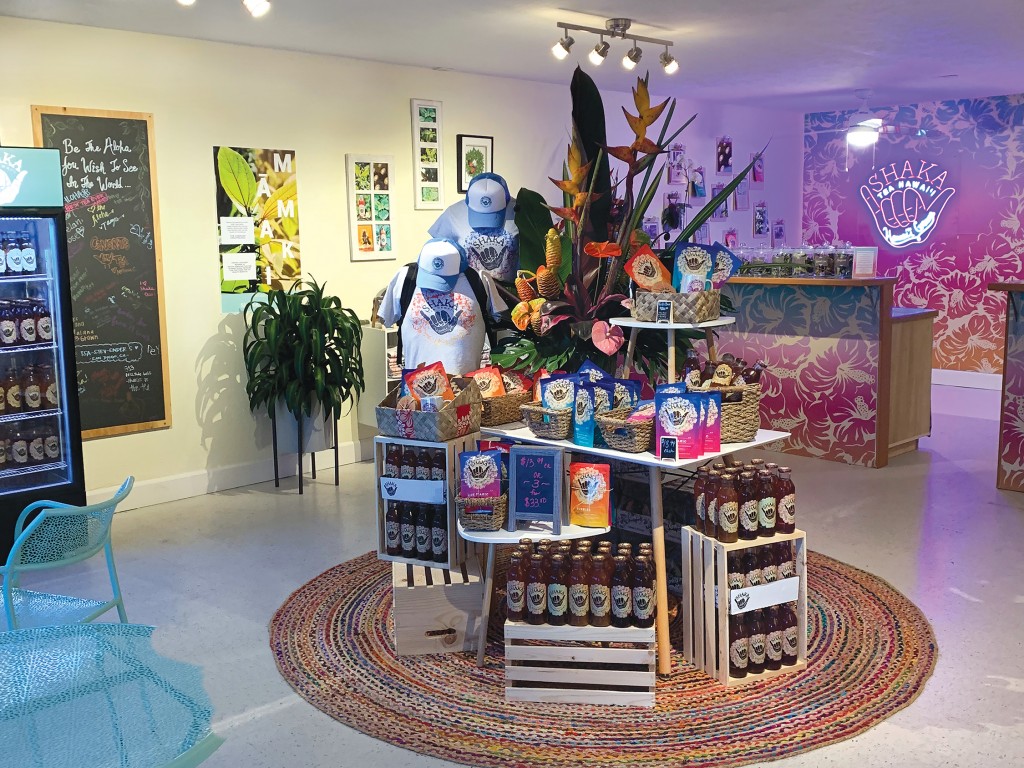Local Businesses With Neighbor Island Headquarters

Who says you need to be based on O‘ahu to make it? These entrepreneurs opted for Neighbor Island headquarters and are expanding their businesses from hyperlocal hubs.
The culture of capitalism worldwide has an urban-centric narrative that says to really make it, you have to go to a big city or commerce hub. Hawai‘i is no different: From a business perspective, the Neighbor Islands are typically viewed as secondary satellites orbiting O‘ahu – some people still call them “the Outer Islands.” But we’re also living in a time of peak global interconnectivity, when the physical location of a company’s headquarters is less important than ever in many business sectors.
Some Hawai‘i entrepreneurs take advantage of that flexibility by creating a wave of reverse migration to smaller Neighbor Island communities. The strategy to buck the urban hub model and go all in on building a Neighbor Island base is itself an innovation that we call the hyperlocal hub model.
We talked to several business founders – all O‘ahu natives – who either moved their headquarters from O‘ahu to a Neighbor Island or deliberately bypassed O‘ahu altogether to start on a Neighbor Island. All say a Neighbor Island base provides valuable upsides despite some challenges.
Kealopiko
Hawaiian apparel company Kealopiko, co-founders Ane Bakutis, Hina Kneubuhl, and Jamie Makasobe moved the company headquarters and most of its production to Moloka‘i, where Ane’s husband is from. For Bakutis, who grew up in Wai‘anae, to be on Moloka‘i may have started with family as the driving force, but it was also a way to help grow that island’s economy and transplant Kealopiko’s roots to a community more aligned with the company’s values of sustainability, conservation and authenticity.
“When you come to a community like Moloka‘i, you realize very quickly in order for people to survive here, you have to make your own opportunities,” says Bakutis, who lives on Moloka‘i, while Kneubuhl splits her time between Maui and New Zealand and Makasobe between O‘ahu and Hilo.
“We realized we could help make that economy; we could provide jobs for people here. I think the greatest upside is that you’re supporting the community that you live in.”
Bakutis acknowledges it would be easier and cheaper to base the company on O‘ahu, where it opened a store
in 2016, but being on a Neighbor Island lends authenticity to the brand that offsets sacrifices in operating efficiency and cost.
“(Moloka‘i is) a very Hawaiian community, and the values of sustainability are already here. Everybody hunts, everybody fishes, everybody has land to grow stuff on and it’s almost like second nature. We’re really grounded to the ‘āina. And that comes through, I think, in our products.”
Bakutis says the essence of the Hawaiian lifestyle captured in Kealopiko’s products would be harder to translate into the company’s manufacturing process if it were based elsewhere.
The company’s commitment to infusing aloha and authenticity into its products even shapes its employee policies. “We have a rule: If you’re having a bad day, don’t come to work because it’s like making a lei; if you’re thinking negative thoughts while you’re making a lei, your lei is going to be really ugly or fall apart, and the person wearing it is not going to feel good wearing it. So if you’re making a garment, and if you’re not having a good day, you’re talking negatively, the person who’s eventually going to own that shirt is not going to feel good wearing it.”
Bakutis says her team on Moloka‘i inherently understands and respects this approach. “I don’t know if I would get that on O‘ahu, or anywhere else,” she says. “Our success is based on our community. Neighbor Island communities are really special and they’re different than O‘ahu. As more and more people move to O‘ahu, I’ve noticed that when I go there, I see local culture being lost or replaced with more American culture.
“Neighbor Islands are the strongholds for local culture and Hawaiian culture, and any business that wants to move to one of the Neighbor Islands or to support that community, needs to respect that local culture.”
The Kealopiko lifestyle clearly resonates with customers in Hawai‘i, which accounts for 65% of its sales, and with its e-commerce customers on the Mainland and internationally.
Ululani’s Hawaiian Shave Ice
A Maui base gives Ululani’s Hawaiian Shave Ice the advantages of strong local community support as well as a relatively uncrowded playing field. Co-founders Ululani “Ulu” and David Yamashiro and Brad Edgerton, a longtime friend, spent almost seven years selling shave ice in Portland, Oregon, and Vancouver, Washington, but then felt the call home to Hawai‘i and the desire to be closer to family. Unfortunately, it was 2008, the height of the economic recession.
The couple first considered a shop on O‘ahu, where they both grew up, but David’s sister, Iolani, on Maui urged them to set up there, where they’d face less competition and could stay with her rent-free. Ululani’s Hawaiian Shave Ice made its local debut on Front Street in Lahaina in December 2008.
David Yamashiro says the crowded shave ice market on O‘ahu would have made it difficult for Ululani’s to stand out. “It probably wouldn’t have been that easy to be named one of the best in Hawai‘i if we didn’t start on Maui,” he says.
He says the company found quick success because it fed a pent-up demand: People on Maui were hungry for good products and service. “When we came on board, service in almost every aspect in a lot of food businesses and some industries on Maui was nonexistent.” The attitude seemed to be: “ ‘If you didn’t like it … go somewhere else … you’ll be back,’ That was the mindset,” he says.

Ululani’s “iceinair,” one of the company’s signature shave ice “moves” | Photo courtesy of Ululani’s Hawaiian Shave Ice
“But with the fine dining background that I had, we started creating an experience for our customers and pairing flavors for them. From the homemade syrups with fruit purees and pure cane sugar to the Maui made ice cream and mochi, everything we did was of a gourmet level, and when we added the service in on top of that, it was game-changing.”
Word of mouth travels fast in a small community, plus Ululani’s racked up five-star reviews online, first on TripAdvisor, then on Yelp, from locals and tourists alike.
The store didn’t have a staff beyond the owners at first, but he says that when they were ready to hire, they turned to their fans first. “All the people that came to work for us in the beginning were customers of ours. I was able to hand-pick from the best customers that we had, who would say, ‘Uncle, let me help you. You don’t have to pay me.’ They would show their heart.”
The local support paved the way for new growth: The company now has its first franchise location in Kona, a franchise that will open in Hollywood this year, and a master franchise agreement for nine countries in the Middle East.
Both Yamashiro and Bakutis cite the logistics and cost of shipping as major challenges to being based on Neighbor Islands.
“Gas is 80 cents to a dollar per gallon higher here than on O‘ahu,” Yamashiro says. “The cost of goods is higher because everything that is shipped to Maui has to be shipped to O‘ahu first.”
Bakutis, who is based on Molaka‘i, agrees. “You can’t just drive to the port of Honolulu, unload your stuff and deliver it to the shop on O‘ahu. It is a big expense, but in the long run it’s worth it.”
Shaka Tea
While a Neighbor Island base can mean higher fuel and shipping costs, some parts of the Neighbor Islands offer substantial savings on overhead. Bella Hughes, co-founder of Shaka Tea, grew up on O‘ahu and started the company there in 2016 with her husband, Harrison Rice. In 2018, lured by a lower cost of doing business, a lower cost of living and the desire to be closer to its māmaki tea supply, the couple moved the company to Hilo.
“In our industry, when you look at the cost of running a business in Honolulu, it’s half the cost to run it in Hilo so moving to Hawai‘i Island made financial sense. That’s really important when you want to put most of your resources into really growing the business and not into overhead,” she says.
Hughes knew that cutting costs and moving to Hilo would best enable her to prime the brand for nationwide growth. Shaka Tea does 80% of its business today on the U.S. continent, where the company also bottles its tea and has a national distribution network. Today, its teas are found in 3,000 stores across 50 states.
Hughes says her ambition was always to be a national brand, and that the main challenges of being based in Hilo are no different than they were on O‘ahu: distance from major retailers and not having economies of scale.
“Running a national business out of Hawai‘i means an intense amount of travel. All the major account headquarters are in the U.S. continent. So whether I lived in Honolulu or Hilo, I regularly take two to three flights, one way, for a 20 minute meeting with the top five largest retailers in the United States.”

Shaka Tea’s tea blending bar in Hilo that serves only Hawai‘i-grown teas Photo courtesy of Shaka Tea
Another big advantage of being in Hilo is a much closer relationship with Shaka Tea’s sister company, Shaka Forest Farms, a hui of māmaki growers on the island. “The pro is that we’re championing the growth of an entire new industry and ag export crops, as well as growing a network of independent growers,” Hughes says.
She says she doesn’t see any real downsides to being based in Hilo and that it has been fulfilling to be able to open a retail shop, add jobs locally and invest in employees.
“I know we would not have been able to make as many hires had we stayed on O‘ahu. We were able to cut down on the higher cost of living on O‘ahu and day-to-day overhead expenses, which enabled us to bring on two hires for U.S. continental support and locally in Hilo, our in-house processing, because we’re moving to start manufacturing and drying the māmaki tea ourselves here.”
Reverse migration out of urban locations is a trend Hughes has noticed not just in Hawai‘i but nationwide, particularly for products like hers in the food and beverage or ag sectors.
You’re not married to an urban core because it’s a distribution game for scalable consumer packaged goods, she says. “You can run that from anywhere and often you want to be close to your supply. It made a lot of sense for us to be in Hilo because the entire premise of the Shaka Tea brand is taking hero ingredients, starting with māmaki, a Hawai‘i-grown ingredient and sharing it with a global demand.”
Hughes endorses a Neighbor Island base for any business that wants to grow outside the Islands but warns that it means a lot of time on the road.
“For us, it’s paid off. We’ve grown 537% since last year,” she says, listing off the many chain stores they are in nationally or regionally, including Whole Foods, Lucky’s, Fresh Thyme and Walmart.
Neighborly Advice:
Advice on how to base your business on a Neighbor Island, from those who’ve done it.
1. Root Yourself In The Community
Ane Bakutis of Kealopiko: I think you have to live there. The companies that are very successful are rooted in that community and that place. Let’s say you don’t currently live there or you’re not from that island, then you need to have a real connection to that place or to people who live there. Moloka‘i’s not a community you just can come to and think you’re going to make it unless you have that connection.
2. Start With Your End Goal
Bella Hughes of Shaka Tea: Ask yourself, “What business am I building?” If your ambition is to strictly be a Hawai‘i-based business, then it’s always about population size and how many people you can serve. So O‘ahu makes sense. However, if your market is outside of the Islands, I highly recommend being based on a Neighbor Island, especially on Hawai‘i Island. I can only speak to my experience being in the non-alcoholic food and beverage category – it could be different for other industries – but the cost of overhead operations is basically half of what it is on O‘ahu, so you can funnel in more money to support your growth, to hire more team members.
3. Do Your Homework First
David Yamashiro of Ululani’s Hawaiian Shave Ice: Research the Neighbor Island competition and have people you know there try the different products or services. Then you will know immediately if you can not only make it, but thrive.






